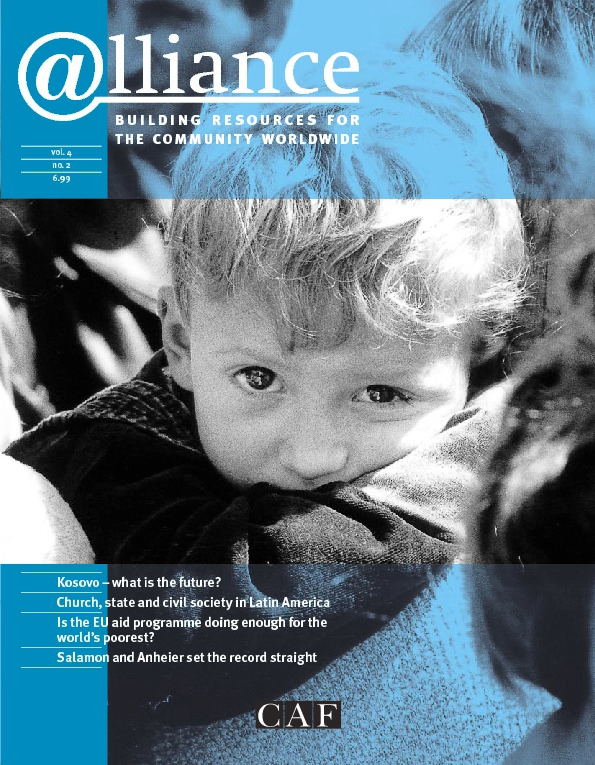In response to mounting concerns about the impact of the global economy on people’s daily lives around the world, many activists have taken to the streets to protest worker exploitation and growing economic injustice. Alternative approaches to this global challenge are also beginning to emerge. In April 1999, for example, the International Youth Foundation, Nike and the World Bank launched the Global Alliance for Workers and Communities, an initiative that seeks to improve the lives of factory workers in developing countries.
Each of these different types of organization participating in the Global Alliance makes a distinct contribution.
Giving a voice to workers’ aspirations
The Alliance has two primary objectives. The first is to give voice to the concerns and aspirations of factory workers, initially those employed by the footwear and apparel industry, mostly young women in their late teens and early twenties. Working with local university-based research teams, the Alliance has already interviewed over 3,000 workers in 12 Nike vendor factories in Thailand and Vietnam, and 4,000 more interviews are under way in 18 Nike and Gap factories in Indonesia. This unprecedented worker assessment process includes in-depth interviews, surveys and focus groups. These workers are being asked, often for the first time, about their plans for the future, the skills they would like to learn both on and off the job, their aspirations for their children, and their suggestions for how to improve their workplace and local communities.
While wages are clearly an ongoing concern, workers are also interested, for example, in learning more about health care for themselves and their families. In addition to getting more job training, workers want to gain ‘life skills’ that will improve their long-term prospects – from finishing high school or learning how to be good parents to managing their incomes and becoming small entrepreneurs. Like parents everywhere, these workers have very high hopes for their children. Suggestions for improving the community include the creation of day care centres and drug abuse programmes.
Responding to these aspirations
Listening to workers’ voices is, of course, only the beginning. The second objective of the Alliance is to design and deliver programmes that respond to the hopes and concerns expressed. Health is clearly a top priority for workers, so one of the first steps in the implementation phase is to offer training sessions in the workplace on women’s health issues and nutrition. Mobile clinics have already been brought into five factories in Thailand, providing counselling and services on health problems ranging from breast and cervical cancer to pregnancy care and sexually transmitted diseases – problems specifically raised by the predominantly female workforce. A number of workers will also be trained as ‘peer educators’, who will share what they have learned with their fellow workers – a recognition that it is often easier for people to approach their peers than medical personnel or management.
Different partners’ roles
In addition to providing financial resources, the corporate members provide essential access to their vendor factories and the opportunity to develop a cooperative relationship with factory management for the purpose of improving the workers’ lives inside and outside the factory.
The World Bank brings a wealth of highly relevant experience on topics identified as critical by the workers themselves, such as health, education and income generation. In addition, through its network of field offices the Bank helps identify needs assessment and training/development organizations. It can also help discuss broader worker development issues with member governments as part of its ongoing policy dialogue.
St John’s and Penn State Universities, also part of the Global Alliance, provide targeted research assistance to help better understand the long-term impact of worker enhancement programmes, internships for students, and some of their licensing revenue to underwrite some of the Alliance’s activities in countries that manufacture university-related apparel and sports equipment. Penn State is also developing a system for archiving all the Alliance’s needs assessment data so that it can be accessible to researchers and various interested publics.
NGOs, both local and international, offer a wealth of programmatic expertise that the Global Alliance will draw on in delivering programmes that are responsive to workers’ needs. The International Youth Foundation provides a network of nationally organized NGOs that help identify potential assessment and training organizations and can help in the liaison with national governments.
Long-term aims
Over the next few years, the Global Alliance hopes to develop a new and pragmatic framework within which corporations, foundations and NGOs can work together to improve the lives and prospects of workers. The aim will be to develop a set of ‘best practices’ that can be replicated more broadly in other companies, industries and regions. In five years’ time, the Alliance plans to be active in 15 countries in Asia, Central America and Central Europe.
It is also committed to ensuring its worker training and other development programmes are sustained over time and can make a lasting impact on people’s lives. It thus looks for in-kind and other contributions from factory managers, so that they have a real stake in the programme’s success. It also develops linkages with ongoing programmes in the community, and seeks to enhance services and institutions that already exist, such as schools and clinics.
It is not part of the Alliance’s mission to endorse or monitor any participating company’s labour practices – although participating corporations must have a code of conduct that is consistent with international norms and standards, and be serious about living up to them. Nor does the Alliance seek to replace either the role played by trade unions, who particpate in Global Alliance activities in countries where there are independent unions, or the independent monitoring of a factory’s compliance with labour standards and the law. While the surveys collect information on current job and workplace conditions, the primary focus is on workers’ aspirations, health and nutrition needs, and community involvement.
This is uncharted territory. Given the challenging nature of the initiative and the risks involved, the Alliance partners are committed to be as open and transparent as possible – as evidenced by Nike and Gap voluntarily opening up their vendor factories for an unprecedented in-depth assessment of workers’ issues and concerns. All assessment tools and results, as well as regular updates on the initiative, are available on the Alliance’s website, http://www.theglobalalliance.org.
The larger impetus driving the Alliance is the recognition that today’s global companies – at least for the foreseeable future – will continue to outsource millions of jobs to factories in developing countries, where citizens have limited access to education, health care and training. The real challenge is to build multi-sector partnerships and develop a global framework that will ensure the benefits of global business are realized by all involved – the multinational companies, the local factories, and of course the workers themselves.
For more information
http://www.theglobalalliance.org





Comments (0)